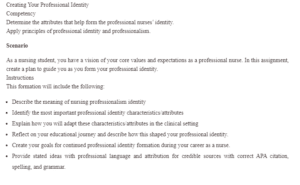Professional Identity
In its basic definition, professional identity refers to the set of principles that define an individual in their professional career. As such, professional identity may also be observed based on attitudes, beliefs, experiences, and professionalism. American Nurses Association (2019) suggests that these values are integral in influencing the kind of individuals we interact with within our line of profession. Besides, these experiences, alongside professional interaction, usually define one’s professional identity. The following literature aims to critically analyze the concept of professional identity, identify some of the most critical attributes defining professional identity, how they can be adapted within the clinical setting, and how my educational path has shaped my professional identity (American Nurses Association, 2019).
According to the American Nurses Association, the attainment of professional identity occurs when nurses internalize and reflect on some of the core values that govern nursing practice, take part in personal alongside professional development, as well as gain experience in the practice setting while developing in the profession. One of the requisite attributes for developing a personal identity as a nurse is knowledge. To achieve higher knowledge in the profession, I would analyze and apply information retrieved from critical reflection, experiences, and scientific evidence to nursing practice. The other crucial attribute for nurses to develop a professional identity is effective leadership (Maginnis, 2018). One way I intend to achieve this is by inspiring myself and my colleagues to change the shared vision into a reality. Ultimately, the last attribute relates to the professional compartment. I intend to achieve this as reflected through my actions, presence, and words.
Throughout my educational journey, I have been able to improve certain skills that will be crucial in reinforcing my professional identity. One of the skills pertains to effective communication. I am now able to communicate effectively in a way that fosters mutual respect and promotes shared decision-making that improves knowledge alongside the experience. Besides, as I continue with my BSN program, I have come to appreciate the crucial role played by evidence-based practice in promoting continuous quality improvement in clinical practice. My educational journey has also been characterized by professionalism (Silveira & Campos, 2019). Through professionalism, I have been able to demonstrate high levels of accountability as a lifelong learner to deliver quality patient care. This has allowed me to comprehend some of the professional standards of practice, the appraisal of that practice, as well as the accountability and responsibility of the practice outcome.
I intend to enroll in a leadership course that will be crucial in fostering my leadership skills for my short-term goal. By gaining leadership skills, I will be able to depict leadership in a professional practice setting through accountability, collaboration, change management, and influence in a manner that facilitates the establishment and realization of shared goals. For my long-term goal, I intend to engage in life-long learning that will be instrumental in making me knowledgeable and responsive to the ever-changing healthcare system and demonstrate my ability to gain access to resources in an effective, safe, and financially responsible way to accord value-based care.
Conclusion
In summary, the attainment of professional identity occurs when nurses internalize and reflect on some of the core values that govern nursing practice, take part in personal alongside professional development, as well as gain experience in the practice setting while developing in the profession. Throughout my educational journey, I have been able to improve certain skills that will be crucial in reinforcing my professional identity. One of the skills pertains to effective communication. I am now able to communicate effectively in a way that fosters mutual respect and promotes shared decision-making that improves knowledge alongside the experience.
References
American Nurses Association. (2019). Professional Role Competence – ANA Position Statement. ANA. https://www.nursingworld.org/practice-policy/nursing-excellence/official-position-statements/id/professional-role-competence/
Maginnis, C. (2018). A discussion of professional identity development in nursing students. Journal of Perspectives in Applied Academic Practice, 6(1).
Silveira, G. L., & Campos, L. K. S. (2019). “Speed up”! The Influences of the Hidden Curriculum on the Professional Identity Development of Medical Students. Health Professions Education, 5(3), 198–209. https://doi.org/10.1016/j.hpe.2018.07.003
ORDER A PLAGIARISM-FREE PAPER HERE
We’ll write everything from scratch
Question

Professional Identity
Creating Your Professional Identity
Competency
Determine the attributes that help form the professional nurses’ identity.
Apply principles of professional identity and professionalism.
Scenario
As a nursing student, you have a vision of your core values and expectations as a professional nurse. In this assignment, create a plan to guide you as you form your professional identity.
Instructions
This formation will include the following:
- Describe the meaning of nursing professionalism identity
- Identify the most important professional identity characteristics/attributes
- Explain how you will adapt these characteristics/attributes in the clinical setting
- Reflect on your educational journey and describe how this shaped your professional identity.
- Create your goals for continued professional identity formation during your career as a nurse.
- Provide stated ideas with professional language and attribution for credible sources with correct APA citation, spelling, and grammar.

